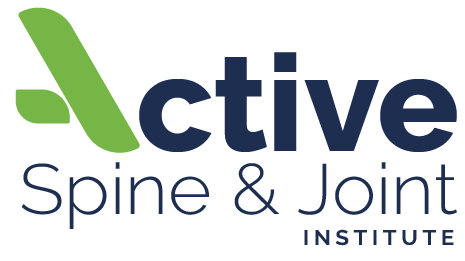Understanding Hip Pain Progression and Treatment Options
Hip pain is a complex issue that often begins subtly, and many of us tend to overlook it initially, relying on over-the-counter medications for relief. At Active Spine and Joint Institute, we acknowledge the challenges associated with hip pain and the common journey many individuals take from mild discomfort to the consideration of major surgeries. There is a typical progression of hip pain management, exploring various treatment options, and the importance of exploring alternatives to hip replacement.
The Journey of Hip Pain Management:
Ignoring the Early Signs: Typically, when hip pain starts, individuals may ignore the early signs, attributing it to general discomfort. Over-the-counter drugs become a quick, temporary solution to alleviate the pain.
Doctor's Intervention: As the pain persists and worsens, individuals seek medical advice. Doctors may recommend stretches, physical therapy, or prescribe stronger medications to manage the discomfort.
The Stretching and Medication Phase: Despite adhering to stretching routines and medications, some individuals find only temporary relief. The nagging pain in the hip persists, prompting a reassessment of the treatment plan.
Considering Hip Replacement: Frustrated with ongoing pain, individuals may find themselves contemplating hip replacement as the next step in managing their condition.
This decision often raises questions about how the journey progressed from stretches and pain medication to a major surgical procedure. According to recent stats, over 450,000 hip replacements are performed annually in the U.S.
The lifespan of a hip replacement can vary from person to person based on several factors. On average, modern hip replacements are designed to last for 15 to 20 years or more. However, the longevity of a hip replacement depends on various factors, including the patient’s age, their overall health, their activity level, and any complications they have as a result of the initial surgery.
However, opting for drug-free and nonsurgical alternatives can often provide effective relief without the need for invasive procedures. While hip replacements are a common solution, it's essential to explore conservative options first.
Understanding the Progression of Joint Degeneration:
As joint degeneration sets in, it tends to progress over time. However, it's crucial to recognize that there are alternative methods and treatments available before resorting to surgical intervention. At Active Spine and Joint Institute, we often encounter patients who have been recommended hip replacement but may not necessarily need one. And, in some cases, we find that the hip was never actually the problem to start with.
In many cases, when we have knee pain issues or sciatica pain (or even pain in the foot), we naturally compensate for the way that we walk, sit, stand, sleep, drive and so much more. That gentle shift puts pressure on other joints and begins to wear them down. We’ve seen many patients who come in for hip pain, but we end up treating the knee or lower back pain instead.
In numerous instances, when faced with knee pain, sciatica, or discomfort in the foot, our natural response is to adapt our walking, sitting, standing, sleeping, and driving habits. However, this subtle adjustment can inadvertently exert pressure on other joints, accelerating their wear and tear. At our clinic, we've encountered numerous cases where patients sought relief for hip pain, only for us to discover that the root cause lay in their knees.
A recent patient presented with severe knee and hip pain, impacting her ability to walk and sleep. Despite her insistence that the discomfort was solely related to her hip and sciatica, a closer examination, including x-rays, revealed extensive arthritis and damage in her left knee. Surprisingly, her left knee was the primary contributor to the pain in her right hip. The alteration in her gait, intended to alleviate pressure on her knee, had inadvertently transferred the burden to her hip.
By addressing her knee pain through regenerative cell therapies, occupational therapy, cold laser treatments, and regular adjustments, we successfully alleviated a substantial portion of the pain in her hip. This case highlights the intricate connections between joints and the importance of addressing the root cause to achieve comprehensive pain relief.
And yes, the hip, can be the root cause of your hip pain too. We address various hip pain cases, including:
Hip Osteoarthritis: Common in aging populations, causing pain and stiffness.
Trochanteric Bursitis: Inflammation of the bursa sac leading to hip pain.
Hip Labral Tear: Injury to the cartilage surrounding the hip socket.
If you or someone you know does have ongoing and chronic hip joint pain or is considering a hip replacement, there are some non-surgical alternatives you may want to consider before undergoing surgery.
Exploring Non-Surgical Alternatives:
Regenerative Cell Therapy: Stimulating the body's natural healing processes to address joint degeneration.
Cold Laser Therapy: Reducing inflammation and promoting tissue repair without surgery.
Spinal Decompression: Alleviating pressure on the spine and hips, offering non-invasive relief.
Pulse Wave Therapy: Enhancing blood flow and accelerating healing for joint-related issues.
Occupational Therapy: Targeted exercises and techniques designed to improve daily activities and reduce hip pain.
Chiropractic Care: Addressing joint imbalances and promoting overall musculoskeletal health.:
Challenging the Notion of Immediate Hip Replacement:
For many individuals, hip replacement may not be the only solution. Through early intervention and exploring non-surgical alternatives, it is possible to manage hip pain effectively without resorting to major surgery.
If you or someone you know is considering hip replacement, it's essential to explore alternative methods before opting for invasive procedures. At Active Spine and Joint Institute, our commitment to comprehensive care, advanced treatments, and individualized plans can provide relief without the need for immediate surgery. Don't hesitate to schedule a consultation to explore non-surgical alternatives and regain control over your hip health.
